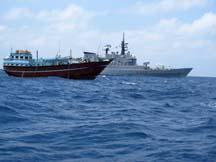Early on the evening of Wednesday 17 March, the Italian Naval Ship SCIROCCO (attached to NATO coalition anti piracy forces) who had been monitoring a hijacked dhow, witnessed pirates leaving the hijacked Iranian dhow SAAD 1 in small boats, known as skiffs. The ships proactive stance had forced the dhow near to the coast.
On the morning of 18 March, the SCIROCCO saw the dhow’s crew asking for assistance and a boarding team was sent to provide assistance. The 19 crew were found to be in good health, and they were provided with water, food and fuel. Some small repairs were also carried out to their VHF radio.
EU NAVFOR understands that the dhow was hijacked about five months ago, and that the pirates had abandoned it as a result of pressure from international naval forces over the last few days. Dhows such as this are often used as “mother ships” to carry their skiffs some distance from the shore and also provide logistical support to Pirate Attack Groups.
The recent introduction of a more aggressive anti piracy policy has reaped rewards with 15 Pirate Action Groups being disrupted in the last 3 weeks between EU NAVFOR and NATO Forces. Pirate boats have been destroyed and weapons have been seized. Rear Admiral Hudson, the Operational Commander of the EU Naval Force – Operation Atalanta stated recently that the naval forces will do their utmost to “get up close to the pirates before they have the opportunity to attack ships”.
EU NAVFOR Somalia – Operation ATALANTA’s main tasks are to escort merchant vessels carrying humanitarian aid of the ‘World Food Program’ (WFP) and vessels of AMISOM, and to protect vulnerable ships in the Gulf of Aden and Indian Ocean and to deter and disrupt piracy. EU NAVFOR also monitors fishing activity off the coast of Somalia.
On the morning of 18 March, the SCIROCCO saw the dhow’s crew asking for assistance and a boarding team was sent to provide assistance. The 19 crew were found to be in good health, and they were provided with water, food and fuel. Some small repairs were also carried out to their VHF radio.
EU NAVFOR understands that the dhow was hijacked about five months ago, and that the pirates had abandoned it as a result of pressure from international naval forces over the last few days. Dhows such as this are often used as “mother ships” to carry their skiffs some distance from the shore and also provide logistical support to Pirate Attack Groups.
The recent introduction of a more aggressive anti piracy policy has reaped rewards with 15 Pirate Action Groups being disrupted in the last 3 weeks between EU NAVFOR and NATO Forces. Pirate boats have been destroyed and weapons have been seized. Rear Admiral Hudson, the Operational Commander of the EU Naval Force – Operation Atalanta stated recently that the naval forces will do their utmost to “get up close to the pirates before they have the opportunity to attack ships”.
EU NAVFOR Somalia – Operation ATALANTA’s main tasks are to escort merchant vessels carrying humanitarian aid of the ‘World Food Program’ (WFP) and vessels of AMISOM, and to protect vulnerable ships in the Gulf of Aden and Indian Ocean and to deter and disrupt piracy. EU NAVFOR also monitors fishing activity off the coast of Somalia.
